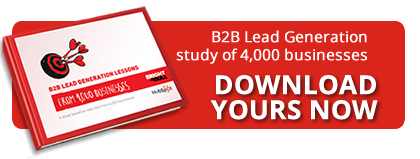
Do you sometimes find yourself on autopilot when creating email marketing for events? Do you churn out the same old communications for every campaign (dates for diary, discount reminder, agenda announcement...yawn)? If you're nodding along and feeling a touch guilty, don't worry, you are not alone. This is a very common state of affairs in events businesses. You're busy. Like really busy. And email is the thing you do most of, so it's not surprising that a few shortcuts and a lack of thinking creep in. But, never fear, help is at hand.
Here's your guide to turning your emails into an event in themselves, build anticipation of your email marketing for your events and get your response metrics on the up.
Marketing plans are habitually written from the marketer's perspective. "I want to send this email to tell them that and this email to tell them that." Stop for a second and think of the poor people you're expecting to read your emails. What do they want? What are they likely to be interested in receiving from you? (Hint: It's not yet another email about the fact that places are booking fast!) Maybe they'd like to hear more from your speakers. Maybe they'd be interested in the results of a survey conducted among their peers.
The only way you're going to figure out what will resonate with your audience is to really understand them. This means investing the effort in creating buyer personas, not just lists of job titles. From there you get an idea of what kind of people they are and can
create email content to appeal to their particular motivations.
Sometimes you have to deliver email content that's not going to set the world alight. You have to tell people the factual stuff about your event at some point or they'll not have enough information to decide whether to go or not. But how you deliver these facts is very much up to you and cramming your writing with salesy language or business jargon is not in any way compulsory.
Having a bit of personality in your writing can liven up the most functional communications and will make people more likely to read your stuff, whether they're directly invested in the subject or not.
As an example, there's a copywriter out there who sends an email selling me something every day. I'm not kidding, every single day without fail. But more often than not I read them. Why? Because I like his writing. He makes me laugh. I imagine if I met him in a bar he'd say something super funny and I'd want to buy him his next pint. Which is a step away from buying his products. (Which I have in case you're wondering).
The two things that
really kill email marketing creativity. The first one is schedules; do you
have to send an email every 2 weeks? No. Not if you don't have something valuable to say. And that's valuable to the customer not you. The second is not being the initiator of your email. And by that I mean your boss, your MD, your sponsorship or sales manager, basically anyone other than you suggesting that you send another email to boost results, please a sponsor etc. Don't do someone else's dirty work for them. It'll not only make for a really poor communication, it'll mean your work day is crammed full of creativity-free comes that make you feel totally robotic and out of control. And people who feel like that don't write good email.
Obviously it can be hard to tell people who are more senior than you that the answer is no, so instead try "maybe not that". Tell them you understand their priorities and you'll go away and thing of the smartest way to address them. That might be getting customer services to dispatch the non-marketing email for you, or it might be coming up with a super-cool social media strategy that'll bring in loads more leads than the suggested email. Either way, you regain control and keep the rubbish off your desk. And they still get what they need. Win win.
You'll notice there are no specific phrases or cheat tactics in the list and for good reason. A cute phrase, a unique call to action or a golden send time won't ever get you long term and sustainable improvements in your email marketing results. You might see an initial lift, but those sorts of tactics lose their impact over time as the audience develops an immunity to them. Particularly when other marketers spot what you're doing and copy your tactics. Investing time in making sound email marketing principles part of your team's DNA may take longer, but you won't be left facing the same problems in a few weeks or months. It's worth it in the long run!
We have more email tips and email tactics for you on the blog, try our other articles or this groundbreaking email workshop:



